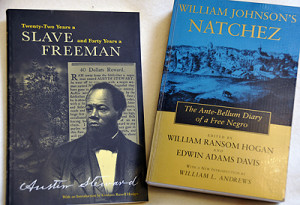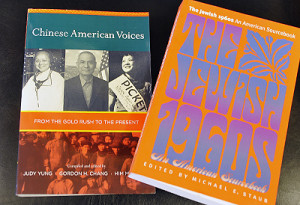This post was written for us by library intern Lisa Smoltino.
Within the extensive US collection are a number of personal papers and diaries that allow researchers a look into the past through the eyes of those who have lived through it. The IHR US collection highlights numerous eras of importance throughout the course of history.
 The US collection includes a large amount of material on African American history in the United States. One of the highlights of the collection is a series of personal accounts by free black men. The plights of slavery are often highlighted through slave diaries and journals, but the lives of free black men during certain time periods aren’t mentioned as often. The primary sources contained in the IHR collection include a number of diaries that detail the daily lives of free black men, both before and after the Civil War. William Johnson’s Diary-William Johnson’s Natchez: The Ante-Bellum Diary of a Free Negro and Twenty Two Years a Slave and Forty Years a Freeman by Austin Steward give an insider’s perspective on what it was like to be black and free in the United States.
The US collection includes a large amount of material on African American history in the United States. One of the highlights of the collection is a series of personal accounts by free black men. The plights of slavery are often highlighted through slave diaries and journals, but the lives of free black men during certain time periods aren’t mentioned as often. The primary sources contained in the IHR collection include a number of diaries that detail the daily lives of free black men, both before and after the Civil War. William Johnson’s Diary-William Johnson’s Natchez: The Ante-Bellum Diary of a Free Negro and Twenty Two Years a Slave and Forty Years a Freeman by Austin Steward give an insider’s perspective on what it was like to be black and free in the United States.
There are also a number of reflective works and essays written by free black men and black political leaders. The collection includes Destiny and Race: Selected Writings 1840-1898 by Alex Crummell, an influential writer and thinker born into free black family based in the northern United States.
Sources on the Civil Rights Era are also among the collection. Among the highlights are two diaries that offer firsthand experience of living through various stages of the Civil Rights Movement– the diaries of David Mays and the letters of Virginia Foster Durr. Mays’ diary, Race, Reason and Massive Resistance: The Diary of David J. Mays, written in the late 1950’s, chronicles the beginnings of what would become an infamous moment in US history. The diary showcases a lesser known but equally important stage of the Civil Rights Movement. Virginia Foster Durr was at the centre of the Civil Rights storm in Birmingham, Alabama, and was the wife of the assistant attorney in the legendary Rosa Parks case. Her diary, Freedom Writer Virginia Foster Durr: Letters from the Civil Rights Years, describes what it was like to be part of the movement that changed America.
 The US collection highlights the experience of new immigrants, such as the Chinese when they arrived in America. Chinese American Voices: From the Gold Rush to the Present are the personal accounts of the struggles of Chinese immigrants to America spanning a long time period since their first arrival in the 1850’s to more current experiences. The Jewish 1960’s ties together the immigrant experience with the Civil Rights Movement, offering a unique perspective of an immigrant community in a volatile time in US history.
The US collection highlights the experience of new immigrants, such as the Chinese when they arrived in America. Chinese American Voices: From the Gold Rush to the Present are the personal accounts of the struggles of Chinese immigrants to America spanning a long time period since their first arrival in the 1850’s to more current experiences. The Jewish 1960’s ties together the immigrant experience with the Civil Rights Movement, offering a unique perspective of an immigrant community in a volatile time in US history.
There are also extensive unique and interesting personal accounts from women at various times throughout US History. Kiowa: A Woman Missionary in Indian Territory is a diary written by Isabel Crawford. This unique book gives the reader an eye into the lives of the Kiowa Indian tribe as seen through the eyes of a woman.
The US collection also contains a number of personal diaries and writings from women during the Civil War. A Maryland Bride in the Deep South takes us inside the everyday life of a well to do woman living in Louisiana at a time of uncertainty and violence.
Women’s voices also offer a cultural perspective and commentary on life in the US. In Southern Women at Vassar: The Poppenheim Family Letters 1882-1916 we are offered a cultural perspective of life in the North through the eyes of the typical ‘Southern Belles.’ This unique perspective also allows the reader to have a glimpse into the early stages of women in higher education.
A second part of this post covering Travel writing in the US collection will follow. More information about the rest of the collection can be found in the United States collection guide.
